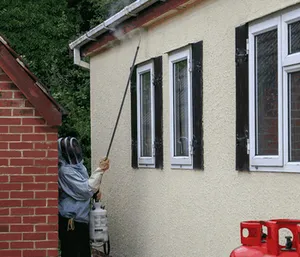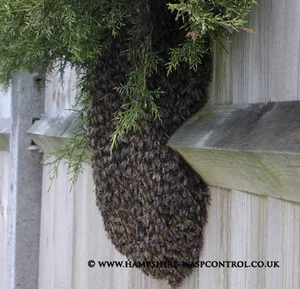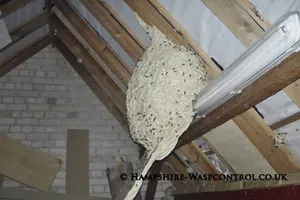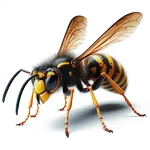Questions answered about wasps - Page:2
How long does it take for wasps to die after treatment?
After treating a wasp nest, we advise customers to avoid the area for a few hours or until all activity has stopped. In reality, wasps usually die within 15 minutes after contact with the treatment. The delayed reaction to the insecticide gives them time to spread it around the whole nest and contaminate it. It can take a couple of hours for all the foraging wasps to return to the nest and come into contact with the treatment. For a large, busy nest, this might take longer. Sometimes, one or two wasps may not return to the nest until the next day, but this doesn't mean the treatment has failed. These wasps will eventually enter the nest and die. We advise customers to be patient and only contact us the next day if the nest is active.
Update: While the above still applies to most nest treatments, there are now new products available that can provide instant results, depending on the situation.

Can honey bees be removed?
In the past decade, the impact of pesticides on the bee population has become apparent. Most people are now aware of this problem and are keen to avoid killing bees unnecessarily. Although bees are not protected, strict guidelines exist for pest controllers to deal with them.
Killing a colony should be the last resort. If deemed necessary, all access points must be blocked after treatment, and the honeycomb should be removed if possible. Bees will take advantage of an unguarded honeycomb with honey stores. Suppose the comb is contaminated with residual insecticide. In that case, the bees raiding it could take contaminated honey back to their nest/hive, killing their colony. Contaminated honey could also enter the human food chain.
New ways of removing bees without using insecticides are constantly being tried and tested. Contact your local beekeeping association to discuss the problem if you have bees.
Please note that we no longer deal with any bee species.

Can you treat a wasp nest next to a pond?
If you have a wasp nest near a pond, we must consider some important factors before taking action. The insecticide we use to treat the nest can harm aquatic life if it enters any nearby water source. Therefore, we will have to discuss the situation with you and form a plan for how we can safely treat the nest without contaminating the water source. However, sometimes, it may not be possible to proceed with the treatment if the risk of contamination is too high.
What is the difference between common wasps and German wasps?
Common wasps are slightly smaller than European wasps, and these are the ones that you will find nesting in your home (loft/shed) or underground.
European (German) wasps build their nests in bushes and hedgerows and are slightly larger than the common wasp.
How can I tell if I have a wasp nest?
If you often find wasps in your garden, a wasp nest is likely nearby. The best course of action is to observe the wasps and determine where they are coming from and where they are going. This will help you locate the nest.
If you suspect the nest is on your property, look at your roof from the outside and walk around your house. If the nest is present, you will notice wasps coming and going frequently, depending on the size of the nest and the time of year. Suppose the nest is located elsewhere on your property. In that case, you will need to follow the direction of the wasps until you can discover the nest. Note that wasps can also nest in holes in the ground.

